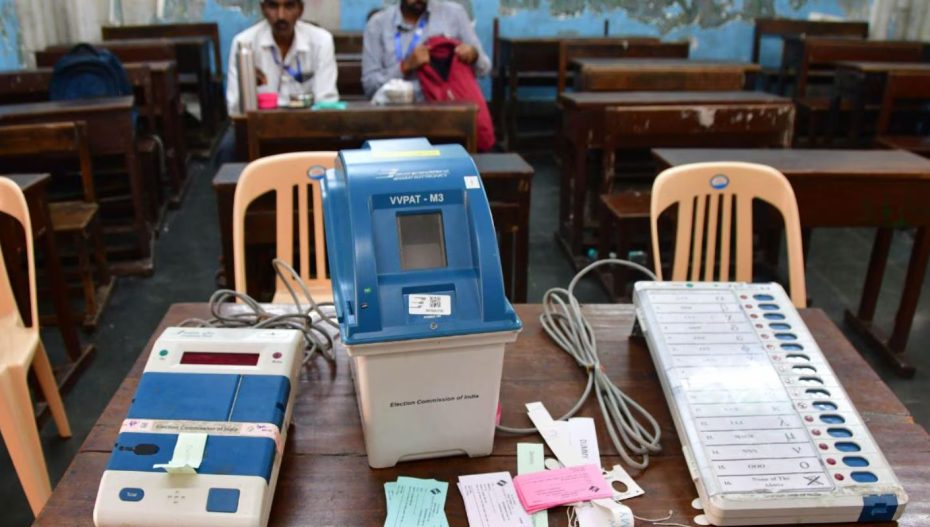Hearing petitions seeking cross-verification of votes cast on Electronic Voting Machines (EVM) with paper slips generated through the VVPAT system, the Supreme Court pointed to problems with the secret ballot voting method.
“We are in our 60s. We all know what happened when there were ballot papers, you may have, but we have not forgotten,” Justice Sanjiv Khanna told Prashant Bhushan, counsel for one of the petitioners, Association for Democratic Reforms. Bhushan was arguing how most European countries that had opted for voting through EVMs have returned to the paper ballots.
“We can go back to paper ballots. Another option is to give VVPAT slip to the voters in hand. Otherwise, the slips fall into the machine and the slip can be then given to the voter and it can be put into the ballot box. Then the VVPAT design was changed, it had to be transparent glass, but it was changed to dark opaque mirror glass where it is only visible when the light is on for second seconds,” he said.
When Bhushan cited Germany’s example, Justice Dipankar Datta asked what’s Germany’s population. Bhushan replied that it is around 6 crore, while India has 50-60 crore voters.
“Ninety-seven crore is the total number of registered voters. We all know what happened when there were ballot papers,” Justice Khanna said.
When Senior Advocate Sanjay Hegde, counsel for one of the petitioners, said votes cast on EVMs should be tallied with VVPAT slips, Justice Khanna replied, “Yes, 60 crore VVPAT slips should be counted. Right?”
The judge said human interventions “lead to problems and human weakness can be there, which includes biases as well”. “Machine normally without human intervention will give you accurate results. Yes, the problem arises when there is human intervention or (a human) makes unauthorised changes when they are around the software or machine, if you have any suggestion to avert this, then you can give us that,” he said.
Bhushan then read out a research paper on the possibility of EVMs being tampered. “They are only counting 5 VVPAT machines per assembly when there are 200 such machines, this is five per cent only and there can be no justification in this. The seven-second light can also lead to manipulation. The voter can be allowed to take the VVPAT slip and put it into the ballot box,” he said.
Senior Advocate Gopal Sankaranarayan, appearing for one of the petitioners, said, “I adopt everything that Mr Bhushan says. We are not saying that there is any malice. Only issue is that of the confidence of the voter in the vote he has cast.”
The court then asked the Election Commission of India about the process of voting, the storage of EVMs and counting of votes. Justice Khanna noted that there is no provision for strict punishment for tampering with EVMs. “This is serious. There should be fear of punishment,” he said.
Sankaranarayan said voters need physical interface and verification. “Allow me to pick up the slip and put it in the box,” he said. The court responded that even if 10 per cent of voters raise objections, the whole process will stop. “Is this rational?” it asked. Sankaranarayan replied, “Yes it must, I am entitled to ask. I am a voter, what do I gain by deliberately stopping the process?”
Justice Dipankar Datta asked the petitioners’ counsel not to compare the Indian election with voting in foreign countries. “My home state West Bengal’s population is more than that of Germany. We need to trust someone. Don’t try to bring down the system like this. Don’t cite such examples. European examples don’t work here,” he said.
Justice Datta asked Bhushan if there is data backing his contention that people don’t trust EVMs. When Bhushan cited a survey, the court said, “Let us not believe in private polls. Let us go by data. The problem with data is that it must be authentic, not based on opinion but actual performance. We will get the data from the Election Commission.”
When a counsel for the petitioners said public sector companies are making EVMs, the court asked if he will be happy if the private sector does it. The matter will be heard next on Thursday.
The VVPAT — Voter Verified Paper Audit Trail — enables a voter to see if the vote was cast properly and went to the candidate he/she supports. The VVPAT generates a paper slip that is kept in a sealed cover and can be opened if there is a dispute. Amid the Opposition’s questions and apprehensions regarding the EVM system of voting, the petitions call for cross-verification of every vote.
The petitions have been filed by the Association for Democratic Reforms (ADR) and activist Arun Kumar Agarwal. Agarwal has sought the counting of all VVPAT slips.
Also Read: Two Accused Of Firing Outside Salman Khan’s House In 10-Day Police Custody












